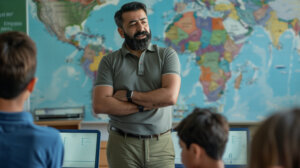Beyond Borders: Global Competency Focus at International Schools in Manila


Preparing students for a global future is important. This article will highlight how International Schools in Manila are specifically designed to foster global competency, helping students thrive beyond traditional academic boundaries. You can’t just learn subjects; instead, you must develop the skills, knowledge, and attitudes necessary for successfully navigating diverse cultures and complex global challenges. In this way, young people are equipped with the skills and principles to become responsible, impactful global citizens.
How International Schools in Manila Foster Global Competency
Global competency is fostered through the distinct curricula, diverse environments, and innovative teaching methods of International Schools in Manila. Their commitment extends beyond traditional classrooms, ensuring students gain real-world experiences and a broad worldview. This comprehensive approach differentiates them from conventional educational settings.
International Curriculum and Global Perspectives
International Baccalaureate (IB) programs, American education systems, and British educational systems were adopted by these schools. Each of these frameworks integrates global perspectives into every subject. As students move beyond a purely nationalistic viewpoint, they explore global challenges, diverse histories, and international issues. The subject of the global environmental crisis might be discussed in history lessons, while geopolitical events might be compared across continents in science classes.
Inquiry-based learning, project-based activities, and critical thinking are emphasized in the curriculum. This allows students to explore complex global issues, analyze evidence from multiple perspectives, and formulate informed conclusions. Many schools also offer extensive language programs, including French, Spanish, and Mandarin, which not only develop linguistic fluency but also foster deeper cultural understanding. This strong academic foundation is designed to prepare students for higher education globally.
Diverse Learning Environments and Multiculturalism
A defining feature of International Schools in Manila is their incredibly diverse student body and staff. These institutions attract students from dozens of different nationalities, creating a vibrant, multicultural learning environment. Daily interactions with peers and teachers from varied backgrounds naturally expose students to a wide array of cultural norms, ideas, and perspectives. This constant exposure is a powerful tool for developing intercultural understanding and empathy.
The schools actively celebrate this diversity through various events, cultural days, and inclusive practices. For example, events like Philippine Day or International Day allow students to share and experience different traditions, music, dance, and cuisines. This integration of diverse cultures into the curriculum and daily life fosters open-mindedness, tolerance, and respect. It encourages students to appreciate differences and to build meaningful relationships across cultures.
Experiential Learning and Community Engagement
Beyond classroom learning, international schools prioritize experiential learning and active community engagement to foster global competency. They organize various activities that immerse students in real-world global issues. This includes participation in international conferences, webinars with global speakers, and collaborative projects that address societal challenges. Students gain first-hand experience of global problem-solving.
Many schools also offer extensive service-learning programs and community work initiatives, sometimes involving projects like ShelterBox or local environmental cleanups. These experiences expose students to diverse socio-economic realities and encourage them to apply their knowledge to make a positive impact locally and globally. These hands-on opportunities build a sense of social responsibility, ethical leadership, and a commitment to contributing to a more sustainable world.
The transformative benefits for Students
The focus on global competency at International Schools in Manila yields transformative benefits for students, preparing them not just for university but for successful careers and fulfilling lives in a globally connected world. These advantages extend far beyond traditional academic achievements.
Enhancing Careers and Global Opportunities
Graduates from international schools with a strong global competency focus are highly sought after in the global job market. Employers increasingly value individuals who can work effectively in multicultural teams, adapt to diverse business environments, and communicate across cultural divides. The cross-cultural communication skills, adaptability, and critical thinking nurtured in these schools are precisely what international companies seek. This strong foundation often leads to enhanced career opportunities and easier access to global universities and professions.
Fostering Innovation and Problem-Solving Skills
Exposure to diverse perspectives and complex global challenges directly fuels innovation and sharpens problem-solving skills. When students collaborate with peers from different backgrounds, they are exposed to multiple ways of thinking about issues and finding solutions. This encourages creative approaches and the ability to think outside traditional frameworks. Critically analyze global problems, such as climate change or poverty. This also equips them with sophisticated analytical abilities and the capacity to propose interdisciplinary solutions.
Cultivating Empathy and Global Citizenship
Perhaps the most profound benefit is the cultivation of empathy and a strong sense of global citizenship. By regularly interacting with people from different cultures, students learn to understand, respect, and appreciate diversity on a deeper level. This first-hand experience helps break down stereotypes and biases, fostering a more inclusive mindset. They develop a sense of shared humanity and a commitment to contributing positively to their local and global communities. This leads to well-rounded individuals who are not only academically accomplished but also ethically grounded and socially responsible.
Key takeaway
For families seeking an education that truly prepares their children for the complexities of the modern world, the global competency focus at International Schools in Manila is undeniably key. These institutions go “beyond borders,” integrating international curricula, fostering diverse learning environments, and emphasizing experiential learning. The transformative benefits for students include enhanced career opportunities, sharpened problem-solving skills, and a deeply cultured sense of empathy and global citizenship.
Choosing such a school means investing in an education that equips young minds not just with knowledge but with the essential skills and mindset to thrive and make a positive impact in our interconnected global society.








